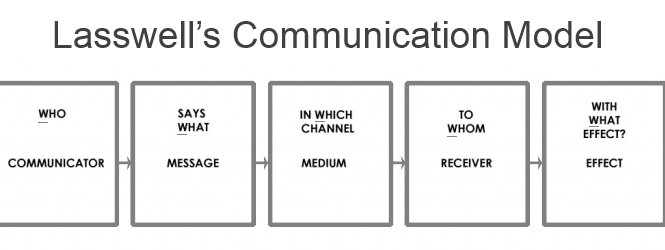Lasswell’s theory of propaganda blended ideas borrowed from behaviorism and Freudianism into a particularly pessimistic vision of media and their role in forging modern social orders. Lasswell was one of the first political scientists to recognize the usefulness of various psychological theories and to demonstrate how they could be applied to understanding politics. The power of propaganda was not so much the result of the substance or appeal of specific messages but, rather, the result of the vulnerable state of mind of average people. This state of mind can be assessed using psychological theories. Lasswell argued that economic depression and escalating political conflict had induced widespread psychosis, and this made most people susceptible to even crude forms of propaganda. When average people are confronted daily by powerful threats to their personal lives, they turn to propaganda for reassurance and a way to overcome the threat. In Lasswell’s view, democracy has […]
FREUDIANISM IN PROPAGANDA
Freudianism, on the other hand, was very different from behaviorism, though Sigmund Freud shared Watson’s skepticism concerning people’s ability to exercise effective conscious or rational control over their actions. Freud spent considerable time counseling middle-class women who suffered from hysteria. During hysterical fits, seemingly ordinary individuals would suddenly “break down” and display uncontrolled and highly emotional behavior. It was not uncommon for quiet and passive women to “break down” in public places. They would scream, have fits of crying, or become violent. Often these outbursts occurred at times when the likelihood of embarrassment and trouble for themselves and others was at its highest. What could be causing this irrational behavior? To explain hysteria, Freud reasoned that the self that guides action must be fragmented into conflicting parts. Normally one part, the rational mind, or Ego, is in control, but sometimes other parts become dominant. Freud speculated that human action is […]
BEHAVIORISM THEORY IN PROPAGANDA
John B. Watson, an animal experimentalist who argued that all human action is merely a conditioned response to external environmental stimuli, first popularized stimulus-response psychology. Watson’s theory became known as behaviorism in recognition of its narrow focus on isolated human behaviors. Behaviorists rejected psychology’s widely held assumption that higher mental processes (that is, conscious thought or reflection) ordinarily control human action. In contrast to such “mentalist” views, behaviorists argued that the only purpose served by consciousness was to rationalize behaviors after they are triggered by external stimuli. Behaviorists attempted to purge all mentalist terms from their theories and to deal strictly with observable variables—environmental stimuli on the one hand and behaviors on the other. By studying the associations that existed between specific stimuli and specific behaviors, behaviorists hoped to discover previously unknown causes for action. One of the central notions in behaviorism was the idea of conditioning. Behaviorists argued that […]
PROPAGANDA COMES TO THE UNITED STATES
Americans first began to give serious consideration to the power of propaganda in the years following World War I. The war had demonstrated that modern propaganda techniques could be used with startling effectiveness to assemble massive armies and to maintain civilian morale through long years of warfare. Never before had so many people been mobilized to fight a war. Never before had so many died with so little to show for it over such a long period of time and under such harsh conditions. Earlier wars had been quickly settled by decisive battles. But in this war, massive armies confronted each other along a front that extended for hundreds of miles. From their trenches they bombarded each other and launched occasional attacks that ended in futility. Harold Lasswell, a political scientist who developed several early theories of media, expressed considerable respect for the propaganda efforts marshaled in the cause of […]
THE ORIGIN OF PROPAGANDA
Propaganda was not an American invention. The term originated with the Roman Catholic Congregatio de Propaganda Fide (Committee for the Propagation of the Faith), an order of the church established by a papal bull in 1622. The Propaganda Fide was originally founded in an effort to suppress the Protestant Reformation. Throughout the first half of the twentieth century, the meaning of propaganda was debated. Was propaganda necessarily bad or was it a good form of communication that could be corrupted? Many forms of communication seek to persuade people—were all of them propaganda? Gradually, the term propaganda came to refer to a certain type of communication strategy. It involves the no-holds-barred use of communication to propagate specific beliefs and expectations. The ultimate goal of propagandists is to change the way people act and to leave them believing that those actions are voluntary, that the newly adopted behaviors—and the opinions underlying them—are […]
Overview of Propaganda
Imagine that you have gone back in time to the beginning of the twentieth century. You live in a large metropolitan area along the East Coast of the United States, and you are a second- or third-generation American. You are a white, middle-class, Anglo-Saxon, Protestant. Your city is growing rapidly, with new neighborhoods springing up daily to house waves of immigrants from poorer nations in Eastern Europe and the Far East. These people speak strange languages and practice strange cultures. Many claim to be Christians, but they don’t behave like any Christians you’ve ever met. Most keep to themselves in ghetto neighborhoods in which there are many social problems. Most disturbing of all, these people seem to have no sense of what it means to live in a free and democratic nation. They are governed by political bosses who turn them out to vote for what you perceive to be […]
